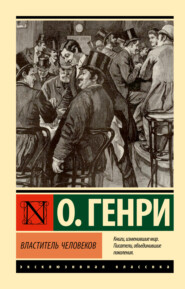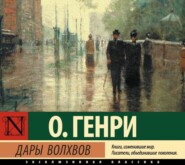По всем вопросам обращайтесь на: info@litportal.ru
(©) 2003-2025.
✖
Options
Настройки чтения
Размер шрифта
Высота строк
Поля
Before long I had become a regular and a welcome visitor at the Greene home. I shook my wild habits from me like a worn-out cloak. I trained for the conflict with the care of a prize-fighter and the self-denial of a Brahmin.
As for Chloe Greene, I shall weary you with no sonnets to her eyebrow. She was a splendidly feminine girl, as wholesome as a November pippin, and no more mysterious than a window-pane. She had whimsical little theories that she had deduced from life, and that fitted the maxims of Epictetus like princess gowns. I wonder, after all, if that old duffer wasn't rather wise!
Chloe had a father, the Reverend Homer Greene, and an intermittent mother, who sometimes palely presided over a twilight teapot. The Reverend Homer was a burr-like man with a life-work. He was writing a concordance to the Scriptures, and had arrived as far as Kings. Being, presumably, a suitor for his daughter's hand, I was timber for his literary outpourings. I had the family tree of Israel drilled into my head until I used to cry aloud in my sleep: "And Aminadab begat Jay Eye See," and so forth, until he had tackled another book. I once made a calculation that the Reverend Homer's concordance would be worked up as far as the Seven Vials mentioned in Revelations about the third day after they were opened.
Louis Devoe, as well as I, was a visitor and an intimate friend of the Greenes. It was there I met him the oftenest, and a more agreeable man or a more accomplished I have never hated in my life.
Luckily or unfortunately, I came to be accepted as a Boy. My appearance was youthful, and I suppose I had that pleading and homeless air that always draws the motherliness that is in women and the cursed theories and hobbies of paterfamilias.
Chloe called me "Tommy," and made sisterly fun of my attempts to woo her. With Devoe she was vastly more reserved. He was the man of romance, one to stir her imagination and deepest feelings had her fancy leaned toward him. I was closer to her, but standing in no glamour; I had the task before me of winning her in what seems to me the American way of fighting – with cleanness and pluck and everyday devotion to break away the barriers of friendship that divided us, and to take her, if I could, between sunrise and dark, abetted by neither moonlight nor music nor foreign wiles.
Chloe gave no sign of bestowing her blithe affections upon either of us. But one day she let out to me an inkling of what she preferred in a man. It was tremendously interesting to me, but not illuminating as to its application. I had been tormenting her for the dozenth time with the statement and catalogue of my sentiments toward her.
"Tommy," said she, "I don't want a man to show his love for me by leading an army against another country and blowing people off the earth with cannons."
"If you mean that the opposite way," I answered, "as they say women do, I'll see what I can do. The papers are full of this diplomatic row in Russia. My people know some big people in Washington who are right next to the army people, and I could get an artillery commission and – "
"I'm not that way," interrupted Chloe. "I mean what I say. It isn't the big things that are done in the world, Tommy, that count with a woman. When the knights were riding abroad in their armor to slay dragons, many a stay-at-home page won a lonesome lady's hand by being on the spot to pick up her glove and be quick with her cloak when the wind blew. The man I am to like best, whoever he shall be, must show his love in little ways. He must never forget, after hearing it once, that I do not like to have any one walk at my left side; that I detest bright-colored neckties; that I prefer to sit with my back to a light; that I like candied violets; that I must not be talked to when I am looking at the moonlight shining on water, and that I very, very often long for dates stuffed with English walnuts."
"Frivolity," I said, with a frown. "Any well-trained servant would be equal to such details."
"And he must remember," went on Chloe, to remind me of what I want when I do not know, myself, what I want."
"You're rising in the scale," I said. "What you seem to need is a first-class clairvoyant."
"And if I say that I am dying to hear a Beethoven sonata, and stamp my foot when I say it, he must know by that that what my soul craves is salted almonds; and he will have them ready in his pocket."
"Now," said I, "I am at a loss. I do not know whether your soul's affinity is to be an impresario or a fancy grocer."
Chloe turned her pearly smile upon me.
"Take less than half of what I said as a jest," she went on. "And don't think too lightly of the little things, Boy. Be a paladin if you must, but don't let it show on you. Most women are only very big children, and most men are only very little ones. Please us; don't try to overpower us. When we want a hero we can make one out of even a plain grocer the third time he catches our handkerchief before it falls to the ground."
That evening I was taken down with pernicious fever. That is a kind of coast fever with improvements and high-geared attachments. Your temperature goes up among the threes and fours and remains there, laughing scornfully and feverishly at the cinchona trees and the coal-tar derivatives. Pernicious fever is a case for a simple mathematician instead of a doctor. It is merely this formula: Vitality + the desire to live – the duration of the fever = the result.
I took to my bed in the two-roomed thatched hut where I had been comfortably established, and sent for a gallon of rum. That was not for myself. Drunk, Stamford was the best doctor between the Andes and the Pacific. He came, sat at my bedside, and drank himself into condition.
"My boy," said he, "my lily-white and reformed Romeo, medicine will do you no good. But I will give you quinine, which, being bitter, will arouse in you hatred and anger – two stimulants that will add ten per cent. to your chances. You are as strong as a caribou calf, and you will get well if the fever doesn't get in a knockout blow when you're off your guard."
For two weeks I lay on my back feeling like a Hindoo widow on a burning ghat. Old Atasca, an untrained Indian nurse, sat near the door like a petrified statue of What's-the-Use, attending to her duties, which were, mainly, to see that time went by without slipping a cog. Sometimes I would fancy myself back in the Philippines, or, at worse times, sliding off the horsehair sofa in Sleepytown.
One afternoon I ordered Atasca to vamose, and got up and dressed carefully. I took my temperature, which I was pleased to find 104. I paid almost dainty attention to my dress, choosing solicitously a necktie of a dull and subdued hue. The mirror showed that I was looking little the worse from my illness. The fever gave brightness to my eyes and color to my face. And while I looked at my reflection my color went and came again as I thought of Chloe Greene and the millions of eons that had passed since I'd seen her, and of Louis Devoe and the time he had gained on me.
I went straight to her house. I seemed to float rather than walk; I hardly felt the ground under my feet; I thought pernicious fever must be a great boon to make one feel so strong.
I found Chloe and Louis Devoe sitting under the awning in front of the house. She jumped up and met me with a double handshake.
"I'm glad, glad, glad to see you out again!" she cried, every word a pearl strung on the string of her sentence. "You are well, Tommy – or better, of course. I wanted to come to see you, but they wouldn't let me."
"Oh yes," said I, carelessly, "it was nothing. Merely a little fever. I am out again, as you see."
We three sat there and talked for half an hour or so. Then Chloe looked out yearningly and almost piteously across the ocean. I could see in her sea-blue eyes some deep and intense desire. Devoe, curse him! saw it too.
"What is it?" we asked, in unison.
"Cocoanut-pudding," said Chloe, pathetically. "I've wanted some – oh, so badly, for two days. It's got beyond a wish; it's an obsession."
"The cocoanut season is over," said Devoe, in that voice of his that gave thrilling interest to his most commonplace words. "I hardly think one could be found in Mojada. The natives never use them except when they are green and the milk is fresh. They sell all the ripe ones to the fruiterers."
"Wouldn't a broiled lobster or a Welsh rabbit do as well?" I remarked, with the engaging idiocy of a pernicious-fever convalescent.
Chloe came as near to pouting as a sweet disposition and a perfect profile would allow her to come.
The Reverend Homer poked his ermine-lined face through the doorway and added a concordance to the conversation.
"Sometimes," said he, "old Campos keeps the dried nuts in his little store on the hill. But it would be far better, my daughter, to restrain unusual desires, and partake thankfully of the daily dishes that the Lord has set before us."
"Stuff!" said I.
"How was that?" asked the Reverend Homer, sharply.
"I say it's tough," said I, "to drop into the vernacular, that Miss Greene should be deprived of the food she desires – a simple thing like kalsomine-pudding. Perhaps," I continued, solicitously, "some pickled walnuts or a fricassee of Hungarian butternuts would do as well."
Every one looked at me with a slight exhibition of curiosity.
Louis Devoe arose and made his adieus. I watched him until he had sauntered slowly and grandiosely to the corner, around which he turned to reach his great warehouse and store. Chloe made her excuses, and went inside for a few minutes to attend to some detail affecting the seven-o'clock dinner. She was a passed mistress in housekeeping. I had tasted her puddings and bread with beatitude.
When all had gone, I turned casually and saw a basket made of plaited green withes hanging by a nail outside the door-jamb. With a rush that made my hot temples throb there came vividly to my mind recollections of the head-hunters —those grim, flinty, relentless little men, never seen, but chilling the warmest noonday by the subtle terror of their concealed presence… From time to time, as vanity or ennui or love or jealousy or ambition may move him, one creeps forth with his snickersnee and takes up the silent trail… Back he comes, triumphant, bearing the severed, gory head of his victim… His particular brown or white maid lingers, with fluttering bosom, casting soft tiger's eyes at the evidence of his love for her.
I stole softly from the house and returned to my hut. From its supporting nails in the wall I took a machete as heavy as a butcher's cleaver and sharper than a safety-razor. And then I chuckled softly to myself, and set out to the fastidiously appointed private office of Monsieur Louis Devoe, usurper to the hand of the Pearl of the Pacific.
He was never slow at thinking; he gave one look at my face and another at the weapon in my hand as I entered his door, and then he seemed to fade from my sight. I ran to the back door, kicked it open, and saw him running like a deer up the road toward the wood that began two hundred yards away. I was after him, with a shout. I remember hearing children and women screaming, and seeing them flying from the road.
He was fleet, but I was stronger. A mile, and I had almost come up with him. He doubled cunningly and dashed into a brake that extended into a small cañon. I crashed through this after him, and in five minutes had him cornered in an angle of insurmountable cliffs. There his instinct of self-preservation steadied him, as it will steady even animals at bay. He turned to me, quite calm, with a ghastly smile.
"Oh, Rayburn!" he said, with such an awful effort at ease that I was impolite enough to laugh rudely in his face. "Oh, Rayburn!" said he, "come, let's have done with this nonsense. Of course, I know it's the fever and you're not yourself; but collect yourself, man – give me that ridiculous weapon, now, and let's go back and talk it over."
"I will go back," said I, "carrying your head with me. We will see how charmingly it can discourse when it lies in the basket at her door."
"Come," said he, persuasively, "I think better of you than to suppose that you try this sort of thing as a joke. But even the vagaries of a fever-crazed lunatic come some time to a limit. What is this talk about heads and baskets? Get yourself together and throw away that absurd cane-chopper. What would Miss Greene think of you?" he ended, with the silky cajolery that one would use toward a fretful child.
"Listen," said I. "At last you have struck upon the right note. What would she think of me? Listen," I repeated.
"There are women," I said, "who look upon horsehair sofas and currant wine as dross. To them even the calculated modulation of your well-trimmed talk sounds like the dropping of rotten plums from a tree in the night. They are the maidens who walk back and forth in the villages, scorning the emptiness of the baskets at the doors of the young men who would win them.
"One such as they," I said, "is waiting. Only a fool would try to win a woman by drooling like a braggart in her doorway or by waiting upon her whims like a footman. They are all daughters of Herodias, and to gain their hearts one must lay the heads of his enemies before them with his own hands. Now, bend your neck, Louis Devoe. Do not be a coward as well as a chatterer at a lady's tea-table."
"There, there!" said Devoe, falteringly. "You know me, don't you, Rayburn?"

















